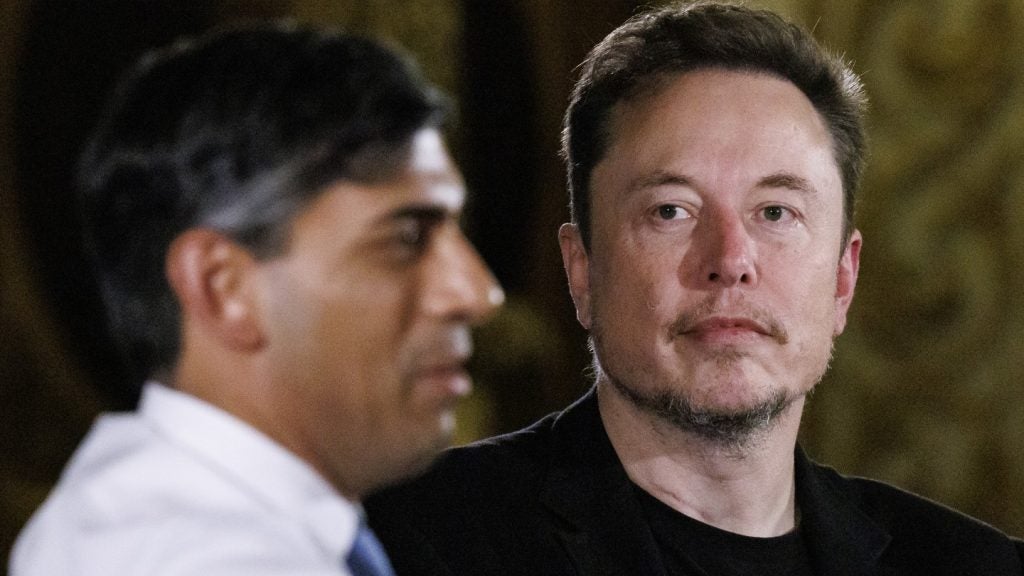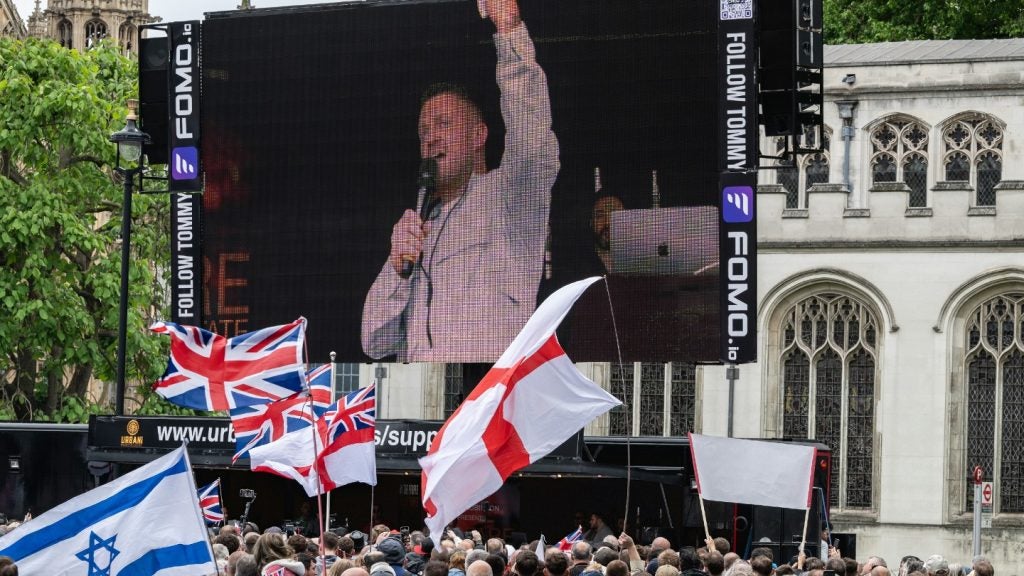
“Civil war is inevitable”.
Yet another inflammatory post posted on X by the platform’s billionaire owner Elon Musk on Sunday (4 August) called into question the role that social media platforms have played in aggravating a wave of racially fuelled riots across the UK.

Access deeper industry intelligence
Experience unmatched clarity with a single platform that combines unique data, AI, and human expertise.
Musk is under scrutiny after UK Prime Minister Keir Starmer, communications regulator Ofcom and human rights group Amnesty International accused social media firms of enabling misinformation and amplifying far-right calls to violent action.
The fatal stabbings of three young girls by a 17-year-old at a dance workshop in Southport on 29 July led to a deluge of unfounded speculation across X, Telegram, Facebook and other platforms that the killer was a Muslim refugee who arrived in the UK by boat in 2023 with a fake name.
Merseyside Police released the name of the accused assailant – in fact, a Cardiff-born Christian with Rwandan parents – to curb further misinformation, but not before a far-right rally targeted Southport Mosque.
Riots subsequently flared up across London, Hartlepool, Aldershot, Sunderland, Liverpool, Plymouth and various other UK towns and cities.

US Tariffs are shifting - will you react or anticipate?
Don’t let policy changes catch you off guard. Stay proactive with real-time data and expert analysis.
By GlobalDataThen began Musk and Starmer’s war of words. The Prime Minister’s spokesperson said there was “no justification” for Musk’s “civil war” comments, adding that social media companies “can and should be doing” more.
Musk replied to a post on X in which Starmer said he would not tolerate attacks on mosques or Muslim communities asking: “Shouldn’t you be concerned about attacks on *all* communities?”
Musk also called Starmer “two-tier Keir”, adding to conspiracy theories that UK police treat white far-right protestors more harshly than minority groups.
Can the UK’s Online Safety Act punish social media firms for fuelling civil unrest?
Starmer and Home Secretary Yvette Cooper, who said Big Tech has put “rocket boosters” under content promoting far-right riots, have promised an immediate crackdown.
Up to 100 far-right protests are reportedly planned for later today (7 August), after a list of immigration lawyers’ offices was widely circulated on a Telegram ‘hitlist’.
The Home Office has widely shared the relevant prison sentences for violent disorder, criminal damage and other offences. Most are between five to ten years.
Speaking after a second emergency Cobra meeting at Downing Street yesterday evening (6 August), Starmer said: “Those involved will feel the full force of the law … Over 400 people now have been arrested, 100 have been charged – some in relation to online activity – and a number of them are already in court.”
Starmer speaks from experience. He served as director of public prosecutions during the last major UK riots in 2011, when his team initiated a system of 24/7 courts to speed up arrests, albeit without the current prison capacity crisis.
Many remain sceptical that those inciting racial hatred on social media will be brought to justice, let alone the tech giants overseeing – and profiteering from – the chaos.
“Toxic algorithms are deliberately designed to prioritise engagement above all else,” Pat de Brún, deputy director at Amnesty International Tech, has said.
“These algorithms are integral to many Big Tech companies’ surveillance-based business model, which seeks to amass ever more of our intimate personal data. They act as incendiaries that fuel division, disinformation, and hate. This model has enabled eye-watering profits for a lucrative Big Tech industry, but has entailed disastrous long-term consequences for human rights, in particular for those most marginalised in society,” according to de Brún.

Social media remains a legal minefield within which to prosecute.
A clampdown on harmful online content has been promised through the Online Safety Act, with “the first set of duties will come into force at the start of next year”, an Ofcom spokesperson tells Verdict.
The Online Safety Act is meant to oblige platforms to block or quickly remove illegal content. However, it seems it will not be able to punish social media firms for the riots.
“[The Act] won’t work in the same way we regulate broadcasters”, the Ofcom spokesperson adds. “It doesn’t give us the power to look into individual events, posts or accounts when reported.”
The ongoing riots will “put pressure on regulators to enforce the legislation”, according to Laura Petrone, senior thematic analyst at GlobalData, but “this is easier said than done”.
"However, this shouldn’t prevent social media from taking action to make their platforms safer in preparation for the new rules," Petrone tells Verdict.
UK media, politicians and commentators under fire
Musk’s flame-fanning has been criticised for contributing to the rioting, but fingers have also been pointed at years of inflammatory rhetoric by far-right politicians, commentators and media.
During addresses in Parliament and on social media, Conservative party politicians have repeatedly named the hotels which they say UK taxpayers fund the government to house asylum seekers in.
Footage from 2020 has emerged of Reform UK Leader Nigel Farage, widely known for stoking immigration fires during the 2016 Brexit vote, turning up to these same hotels far-right mobs are attempting to burn down.
Farage also stands accused of amplifying misinformation that the Southport killer was an Islamist after saying he was misled by indicted felon and influencer Andrew Tate in an interview with LBC.
Far-right commentator Stephen Yaxley-Lennon (alias Tommy Robinson) has kept up a constant commentary, even from abroad.
Former English Defence League (EDL) leader Robinson fled the UK for Cyprus on 28 July, the eve of a high court hearing over contempt of court proceedings, but has repeatedly shared claims the police described as false.
Robinson was formerly banned from X until his account was reinstated just after Musk bought the app in 2022.

MP for Coventry South Zarah Sultana has been particularly prominent in calling out politicians and media.
In a fiery debate on Good Morning Britain, Sultana clashed with host Ed Balls and Daily Mail consultant editor Andrew Pierce over accusations the right-wing tabloid had encouraged racist violence in its headlines.
Here’s just a few examples of Daily Mail headlines that have fanned the flames of hate and normalised Islamophobic and anti-migrant rhetoric #GMB pic.twitter.com/kqzQqewnGk
— Zarah Sultana MP (@zarahsultana) August 5, 2024
Sultana also condemned former Home Secretary Suella Braverman for referring to migrants as an “invasion”. Chants of ‘stop the boats’, a key Conservative Party slogan of Braverman’s and former Prime Minister Rishi Sunak’s, has been heard shouted by rioters across the UK in recent days.
The outbreak of far-right violence is undoubtedly underpinned by poor integration policies and years of economic downturn – but Musk, Big Tech, Farage and other prominent figureheads have much to answer for.
All eyes now turn to Starmer and the UK’s prosecutors, who have earlier today (7 August) issued the first Crown Court sentences for three men who attacked police during riots on Merseyside.
Will the same vigour be applied to those orchestrating the violence online?







